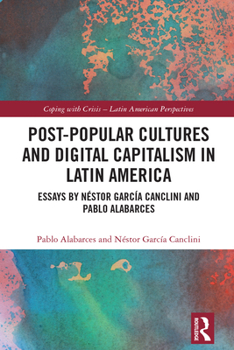Post-Popular Cultures and Digital Capitalism in Latin America: Essays by Néstor García Canclini and Pablo Alabarces
In this book, renowned Latin American intellectuals, Pablo Alabarces and N stor Garc a Canclini, bring us up to date on the changes in the status and role of the popular classes in Latin American democracies over the past two decades. Building on decades-long research and experience in the field of cultural studies, the authors ask how the digitalization and economization of society are changing the reality of political participation and social inequality in Latin America and beyond, leading to new forms of economic and cultural marginalization. Garc a Canclini focuses on the rapid digitalization of our society and economies, ruminating over the future of political participation and democracy in the coming age of algorithms, transnationalization, and social precarity for growing swaths of the population. By contrast, Alabarces focuses on the disintegration and commodification of popular cultures throughout Latin America in the last two decades and discusses the consequences on democratic projects in the region. Both pieces approach the question of how democratic projects on a local, regional, national, and transnational level can deal with galloping social disintegration and accelerating political discontent as an increasing number of people within the course of this digital revolution gain voice: all this against the authoritarian or technocratic alternatives that have been gaining ground again. The introduction by Sarah Corona contextualizes the contributions and their authors in the academic and political debate. She connects their focus on popular cultures to broader questions regarding the future of nation-states and democracies facing multiple crises in the region and beyond. Post-Popular Cultures and Digital Capitalism in Latin America will be of interest to researchers and postgraduate students in political science, sociology, and cultural studies looking to freshen their views as well as develop an understanding of the Global South's perspective on current global issues.





